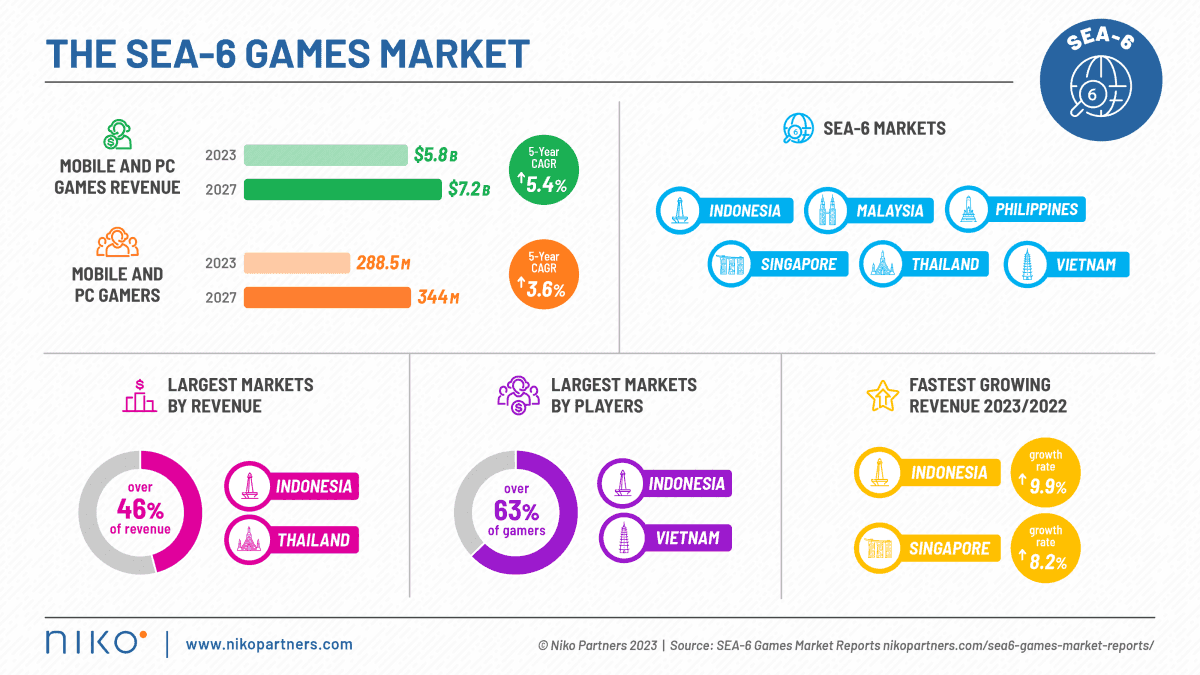The East Asia games market, encompassing Japan and South Korea, remains one of the most influential regions in the global video game industry. Despite a projected short-term decline in 2025, both countries continue to offer unique opportunities for game developers and publishers through a combination of high consumer engagement, technological innovation, and strong local content.
Market Overview and Revenue Projections
According to Niko Partners’ East Asia Market Model and 5-Year Forecast, the combined games market in Japan and Korea generated $29.1 billion in revenue in 2024. This figure represents a year-over-year decrease of 3.1%, with revenue expected to decline further to $28.5 billion in 2025, a 2.3% drop.
The downturn is largely attributed to broader economic factors, including currency depreciation against the US dollar and continued global trade disruptions. Despite these challenges, the market is expected to rebound in 2026 and grow steadily to reach $30.3 billion by 2029, reflecting a compound annual growth rate (CAGR) of 0.8%.

East Asia Games Market Trends 2025
Gamer Population and Spending Trends
The total number of gamers in Japan and Korea is projected to grow modestly in 2025 by 1.3%, reaching 98.4 million. By 2029, the gamer population is forecasted to hit 101.7 million, maintaining a CAGR of 0.9%. This growth underscores the resilience and long-term viability of the East Asia games market despite near-term economic headwinds.
Average revenue per user (ARPU) also highlights the strength of consumer spending in these markets. In 2025, Japan’s ARPU is expected to reach $21.82, while Korea is forecasted at $30.77 - the highest ARPU among all Asian markets tracked by Niko Partners.
Cultural Engagement and Gaming Behavior
Japan and Korea are not only economically significant gaming markets but also deeply embedded in global gaming culture. The success of titles like Monster Hunter Wilds and Stellar Blade, alongside the record-breaking debut of a new VTuber, demonstrates the cultural importance of games in both countries.
Niko Partners' East Asia Gamer Behavior & Market Insights Reports, based on a survey of 1,090 gamers, reveal key trends in player engagement:
- Video and livestream consumption: 46.6% of Japanese gamers and 37.8% of Korean gamers regularly watch gaming-related videos or livestreams.
- Payment behavior: Both Japanese and Korean gamers show the lowest levels of spending on off-app (OOA) platforms among the 13 Asian markets covered by Niko. This presents both a challenge and a potential entry point for third-party payment providers aiming to capture a share of these high-value markets.

East Asia Games Market Trends 2025
Localization and Monetization Considerations
Companies aiming to succeed in Japan and Korea must adapt to specific localization and monetization preferences. Both countries have mature gaming ecosystems with highly engaged users and strong domestic competition. As such, games entering these markets must align closely with local cultural expectations and player preferences.
Effective localization goes beyond language translation to include visual design, game mechanics, and payment systems tailored to regional norms. Monetization strategies also need to be calibrated for each market's unique consumer behavior, particularly given the reluctance toward OOA spending.
Final Thoughts
The East Asia games market, led by Japan and Korea, continues to offer substantial opportunities for global game developers and publishers. While a slight revenue dip is anticipated in 2025, long-term forecasts remain positive, driven by stable gamer growth and strong user engagement. Success in this region will depend on a nuanced understanding of gamer behavior, cultural context, and effective localization and monetization strategies.



